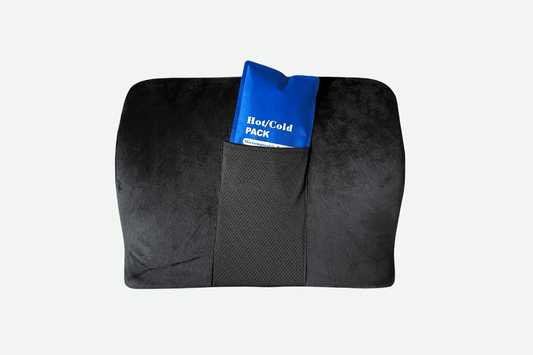Is Yogurt Good for Hemorrhoids?
Robert Cutler, D.O., FAOCPrShare
🗣️ Hemorrhoids are a common condition for an easy-to-explain reason: The veins in your lower rectum are significantly affected by your diet, and bad diets cause hemorrhoids to flare up.
🧂 Even small adjustments to what you eat can mean big results in stopping hemorrhoids before they start. Understanding how foods like yogurt are beneficial to your gut and overall health ensures that you hold the knowledge to take your well being into your own hands.
For example, at Doctor Butler’s, we advise people with dairy sensitivities to avoid:
- 🥛 Milk
- 🧀 Cheese
- 🍦 Ice Cream
🧠 But for most people yogurt is actually a good thing. So why is yogurt good for hemorrhoids? Keep reading to learn of the numerous benefits of incorporating yogurt as a staple in your hemorrhoid self-care routine! Most importantly: preventing hemorrhoids!
Understanding Hemorrhoids
Symptomatic hemorrhoids are caused by a number of different factors, chief among them increased pressure on the rectum. This pressure can be the result of constipation, obesity, pregnancy, aging or simply lifting heavy objects. Internal hemorrhoids are often painless (but might be itchy) and can result in bleeding during bowel movements. External hemorrhoids are visibly swollen veins under the skin around the anus. They can lead to itching, pain, bleeding and general discomfort in this area. An excess of pooled blood can result in a small, hard lump near the anus that leads to significant irritation.
Treatment exists largely in the form of hemorrhoids self-care. Sitz baths, warm compresses, and hemorrhoid cushions all help relieve pain and prevent further swelling. Over-the-counter creams and ointments contain active and natural ingredients, such as lidocaine, hydrocortisone, zinc oxide and witch hazel. These formulas target hemorrhoid symptoms and promote healing. In severe instances, medical procedures are available to remove the hemorrhoid, including rubber band ligation, sclerotherapy or a hemorrhoidectomy. Any recurring flare-up or hemorrhoid that does not respond to at-home treatment should be brought to the attention of a medical professional.
The Role of Diet in Hemorrhoid Management
As with most health concerns, the key to hemorrhoid-free living is prevention. Diet plays a huge role in both preventing recurring flare-ups and managing existing symptoms until the hemorrhoid heals. The backbone of a healthy diet? Fiber, of course.
Both soluble and insoluble fiber play a part in healthy hemorrhoid care. Insoluble fiber is not absorbed by the body, instead adding valuable bulk to stool and therefore providing a way to resolve loose bowel movements and diarrhea by helping it to move through and clean-out the digestive tract and bowels. Soluble fiber breaks down in the body to form a water-absorbing gel that makes your stool soft and easy to pass, preventing conditions such as constipation that are triggers for hemorrhoids.
It’s important to note that while fiber plays a major part in digestive health and the prevention of hemorrhoids in turn, it requires adequate hydration to perform that task. Without fluids, an excess of fiber can lead to bloating, gas and constipation. Remember, fiber works by absorbing water into the digestive tract, so you need enough water to fuel this process.
Yogurt and Hemorrhoids: The Science Explained
Dairy in most of its forms is generally a no-go for piles patients (milk especially is one we’ve warned about in the past: read about that here).
So why is yogurt good for hemorrhoids? It's because yogurt contains beneficial bacteria that helps keep the gut healthy.
(If you’ve had issues consuming dairy products or with lactose intolerance in the past, it’s important to seek medical advice or consult your gastroenterologist when considering adding yogurt to help manage hemorrhoids.)
But what is good bacteria? Don’t worry, we’ll explain it along with the ins and outs of probiotics and what we consider to be the best yogurt for hemorrhoids!
Here we discuss:
- Why yogurt may ease hemorrhoid pain
- Why milk products are one of the most common food allergens1
- How everyone may respond differently to using yogurt for hemorrhoid treatment.
Probiotics and Gut Health
By definition, yogurt is a fermented milk product that must contain a minimum amount of S. thermophilus and L. bulgaricus to be considered a standard culture yogurt2. Bio- or probiotic yogurts have beneficial microorganisms added to these standard cultures, typically Bifidobacteria and L. acidophilus3. A probiotic is thus a live microorganism that must provide a health benefit when consumed4. The probiotics found in yogurt mimic the healthy microorganisms that populate your gastrointestinal tract and help restore the amount of good bacteria within your larger microbiome.
It cannot be overstated how beneficial probiotics are in restoring healthy functioning to the gut microbiome5, making it one of many effective natural remedies for constipation and diarrhea. Consuming yogurt probiotics restores fecal bacteria6, helping to relieve symptoms associated with the two conditions, both of which are known to exacerbate hemorrhoids. As they restore beneficial microorganisms in the gut, probiotics can help target many of the complications that make irritable bowel syndrome and hemorrhoids so debilitating as well. They have been shown to slow the travel time of stool in the colon, improve the consistency of stool and reduce the amount of bowel movements per day for those suffering from IBS7. As hemorrhoids are closely linked to symptoms caused by digestive and gastrointestinal conditions, consuming yogurt to improve gut-related distress is also going to be good for hemorrhoids.
So why is yogurt good for hemorrhoids? It restores fecal bacteria helpful in restoring healthy digestive function after dealing with constipation or diarrhea!
Anti-Inflammatory Properties
Inflammation is your body’s way of responding to perceived threats. Your immune system is activated to attack harmful stimuli or repair damaged tissue, which can result in symptoms such as swelling, redness, bruising, heat or pain as your inflammatory cells respond. Hemorrhoids are a result of inflammation, as the veins around your anus and lower rectum attempt to manage excess pressure and straining. The probiotics found in yogurt help target multiple areas in the body where inflammation is triggered8 and suffuse the body with gut bacteria that balance the immune system and its response9. Yogurt is very good for hemorrhoids because it works to slow the discomfort caused by inflammation, strengthening your ability to handle external disturbances (straining, pressure) and allowing your veins to react with a less severe response.
Fiber Content
Traditional yogurt does not contain fiber, so yogurt that indicates fiber on its nutrition label has fiber added by the producer10. This is typically the result of dietary fibers inserted to promote healthy bacteria growth or the by-product of secondary mix-ins such as fruit, nuts or cereal. As we discussed earlier, foods that contain fiber are instrumental in keeping stools soft and easy to pass – the key to preventing hemorrhoids from acting up.
Incorporating Yogurt Into Your Diet
There are a variety of options for adding yogurt into your daily diet. Before choosing a yogurt for hemorrhoids, remember that not all products are alike. Yogurts with fruit mix-ins and flavors or cereal toppings usually contain added sugar content that can offset the benefits to hemorrhoid health. The negative impacts of excess daily sugar include increased risk of a number of chronic diseases, such as obesity, diabetes, some forms of cancer, non-alcoholic fatty liver disease, cardiovascular disease and more11.
Yogurt with probiotics comes in a range of options, from regular or low-fat dairy, Greek yogurt, Icelandic yogurt, goat or sheep’s milk-based yogurt and a growing list of plant-based options. If you don’t enjoy the taste or texture of yogurt, there are many recipes where it can be used as a substitute for milk, sour cream or heavy cream for a baked-in boost to hemorrhoid wellness.
Other Dietary Considerations for Hemorrhoids
In addition to yogurt, a range of foods can be added to your diet that will help heal and manage hemorrhoids. Fruits, vegetables and whole grains are all great options for providing fiber. For a quick hit, dried fruit such as prunes or even fiber supplements can bring up your daily fiber intake to the recommended 14 grams per 1,000 calories consumed in a day, per the USDA’s dietary guidelines12.
Foods to avoid for hemorrhoids are those that contain little fiber, posing the risk of constipation and further aggravating the condition. These include:
- Milk, cheese and ice cream
- Processed foods
- Prepared foods high in sodium
- Fast food
Looking for more information? Find more in our comprehensive breakdown of the optimal diet for hemorrhoid sufferers.
- How does yogurt affect digestion? The probiotics in yogurt enter your digestive system and help preexisting microorganisms break down food more efficiently.
- Are there any specific types of yogurt that are best for hemorrhoids? Yogurt that contains live cultures or products that contain additional probiotic strains will provide the most benefit to your gut biome. Avoid yogurts with excessive amounts of added sugar or mix-in ingredients that pose further health risks.
- Can I eat yogurt if I am lactose intolerant? While plant-based and lactose free yogurt options are available, we recommend checking with a gastroenterologist before including a yogurt as part of your diet.
- Can eating yogurt replace medical treatment for hemorrhoids? Adjustments to your diet can lead to significant improvement in the at-home management of hemorrhoids, but yogurt or any single food item is never a suitable stand-in for receiving proper medical attention for a concerning or chronic hemorrhoid issue.
- Are there any risks or side effects associated with eating yogurt for hemorrhoids? If you are not lactose intolerant, including probiotic yogurt in a diet along with fruits, vegetables and unprocessed grains should result in improved digestive health and consistent bowel movements with little risk.
- So why again is yogurt good for hemorrhoids? Because if used as part of a diet high in fiber and low in processed foods, yogurt will help keep your digestive track functioning efficiently, stopping constipation or diarrhea, two major causes of hemorrhoids and fissures.
Improve Your Hemorrhoid Management With Doctor Butler’s
As you have read, managing hemorrhoids is closely linked to a healthy and happy gut. Yogurt is an affordable and easily available means to supplement prevention. Not only do the probiotics in yogurt help your body boost digestion and regulate your microbiome, they also help target the inflammation that causes the uncomfortable symptoms we associate with hemorrhoids.
While prevention is important, having the right tools to treat and manage flare-ups is also key. Doctor Butler’s makes a full line of products to assist with proactive at-home care, featuring our award-winning hemorrhoid cream for first timers and an advanced hemorrhoid cream for recurring cases. Take charge of your hemorrhoids and help sooth, heal and restore your health now.
- Milk allergy | Causes, symptoms & treatment | ACAAI Public website. (2022, April 13). ACAAI Public Website. https://acaai.org/allergies/allergic-conditions/food/milk-dairy/
- Nutrition, C. F. F. S. a. A. (2023). FDA amends standard of identity for yogurt. U.S. Food And Drug Administration. https://rb.gy/8j5x7
- Hadjimbei, E., Botsaris, G., & Chrysostomou, S. (2022). Beneficial effects of yoghurts and probiotic fermented milks and their functional food potential. Foods, 11(17), 2691. https://doi.org/10.3390/foods11172691
- Office of Dietary Supplements - Probiotics. (n.d.). https://ods.od.nih.gov/factsheets/Probiotics-HealthProfessional/
- Hemarajata, P., & Versalovic, J. (2012). Effects of probiotics on gut microbiota: mechanisms of intestinal immunomodulation and neuromodulation. Therapeutic Advances in Gastroenterology, 6(1), 39–51. https://doi.org/10.1177/1756283x12459294
- He, Y., Zhu, L., Chen, J., Tang, X., Pan, M., Yuan, W., & Wang, H. (2022). Efficacy of probiotic compounds in relieving constipation and their colonization in gut microbiota. Molecules, 27(3), 666. https://doi.org/10.3390/molecules27030666
- Kumar, L. S., Pugalenthi, L. S., Ahmad, M., Reddy, S., Barkhane, Z., & Elmadi, J. (2022). Probiotics in Irritable Bowel Syndrome: A review of their therapeutic role. Cureus. https://doi.org/10.7759/cureus.24240
- Yuan, M., Singer, M. R., & Moore, L. L. (2021). Yogurt Consumption Is Associated with Lower Levels of Chronic Inflammation in the Framingham Offspring Study. Nutrients, 13(2), 506. https://doi.org/10.3390/nu13020506
- Cristofori, F., Dargenio, V. N., Dargenio, C., Miniello, V. L., Barone, M., & Francavilla, R. (2021). Anti-Inflammatory and immunomodulatory effects of probiotics in gut inflammation: a door to the body. Frontiers in Immunology, 12. https://doi.org/10.3389/fimmu.2021.578386
- USDA ERS - yogurt products and breakfast cereals increasing their fiber contents. (n.d.). https://www.ers.usda.gov/amber-waves/2018/januaryfebruary/yogurt-products-and-breakfast-cereals-increasing-their-fiber-contents/
- Rippe, J. M., & Angelopoulos, T. J. (2016). Relationship between Added Sugars Consumption and Chronic Disease Risk Factors: Current Understanding. Nutrients, 8(11), 697. https://doi.org/10.3390/nu8110697
- Eating, Diet, & Nutrition for Hemorrhoids. (2022). National Institute of Diabetes and Digestive and Kidney Diseases. https://rb.gy/haox9


